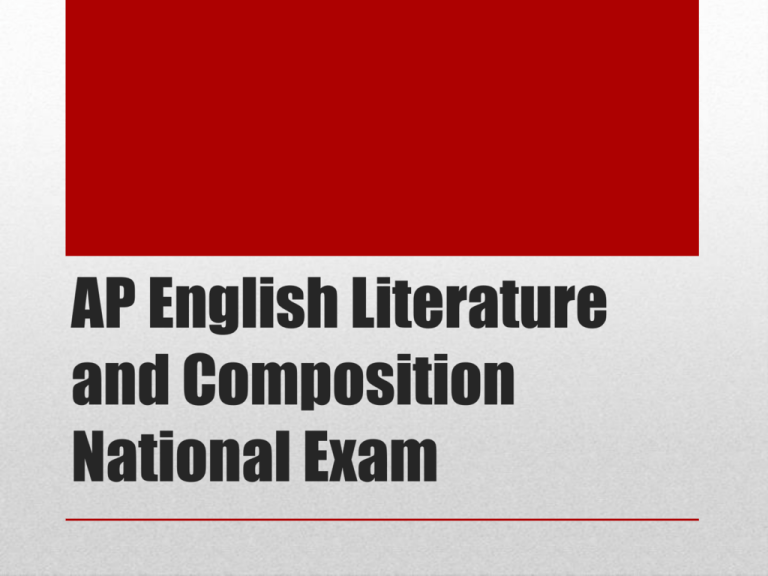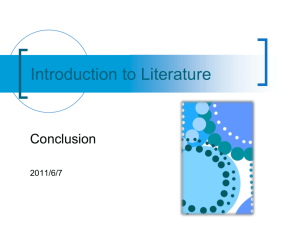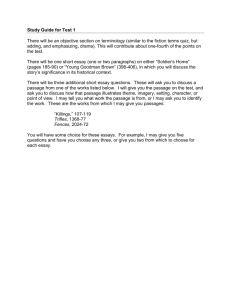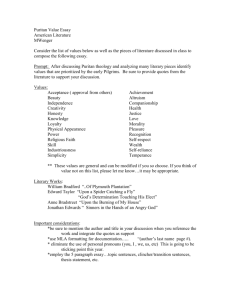AP English Literature and Composition National Exam
advertisement

AP English Literature and Composition National Exam A poem or excerpt from a short story or novel or play will be printed with about 10-12 questions per section. The questions will be on organization, content, literary devices, vocabulary, mechanics, and interpretation. The content will be: - Pre-20th Century Poetry/Modern Poetry - Pre-20th Century Prose/Modern Prose Multiple Choice Questions (45%) POETRY: Either a compare/contrast question with TWO poems with similar themes OR analyze ONE poem. This question could feature poems from pre-20th century/modern/combination. PROSE: This could be an excerpt from a novel or short story, either from pre-20th century or modern. One year it was a complete short story (“Birthday Party”). OPEN RESPONSE: This questions will be focused around literary device (symbol, characterization, theme, point of view, plot, setting, etc.) or a theme (exile, childhood, love, lust, etc.). Most of the time several works of literary merit will be featured as suggestions about which book/play to write about. The works will be taken from both pre-20th century and modern writers. Essay Questions (55%) The AP English Literature and Composition Exam is three hours long and consists of two sections. In Section I, students are given one hour to answer 55 multiple-choice questions; in Section II, they must answer three freeresponse questions within two hours. The multiple-choice questions test students' ability to read analytically prose and poetry from several periods. The free-response questions require students to write critical essays on literary texts. TEST DETAILS (FYI) 1. Which of the following best describes the rhetorical function of the second sentence in the passage? (a) It makes an appeal to authority. (b) It restates the thesis of the passage. (c) It expresses the causal relationship between morality and writing style. (d) It provides a specific example for the preceding generalization. (e) It presents a misconception that the author will correct. Example Multiple Choice (1) 2. The author’s tone in the passage as a whole is best described as (a) harsh and strident (b) informal and analytical (c) contemplative and conciliatory (d) superficial and capricious (e) enthusiastic and optimistic Example Multiple Choice (2) (Suggested time—40 minutes) In the following soliloquy from Shakespeare’s Henry IV, Part II, King Henry laments his inability to sleep. In a wellorganized essay, briefly summarize the King’s thoughts and analyze how the diction, imagery, and syntax help to convey his state of mind. …… the soliloquy would be attached to the bottom of the prompt…. Example Prose/Drama Essay (Suggested time—40 minutes) The passage below is an excerpt from Jennifer Price’s recent essay “The Plastic Pink Flamingo: A Natural History.” The essay examines the popularity of the plastic pink flamingo in the 1950s. Read the passage carefully. Then write an essay in which you analyze how Price crafts the text to reveal her view of United States culture. Example Prose Essay (Suggested time—40 minutes) Read carefully the following poem by the colonial American poet, Anne Bradstreet. Then write a wellorganized essay in which you discuss how the poem’s controlling metaphor expresses the complex attitude of the speaker. Example Poetry Essay (Suggested time—40 minutes) The British novelist Fay Weldon offers this observation about happy endings: “The writers, I do believe, who get the best and most lasting response from readers are the writers who offer a happy ending through moral development. By a happy ending, I do not mean mere fortunate events—a marriage or a last-minute rescue from death—but some kind of spiritual reassessment or moral reconciliation, even with the self, even at death.” Choose a novel or play that has the kind of ending Weldon describes. In a well written essay, identify the “spiritual reassessment or moral reconciliation” evident in he ending and explain its significance in the work as a whole. You may select a work from the list below or another novel or play of literary merit. Free Response Essay The Major Question in AP English? How does the writer use a literary device or technique to achieve meaning? 1. Read closely and annotate the text 2. Ascertain the subject of the passage 3. Recognize major literary (or poetic) devices within the passage 4. Recognize rhetorical/literary techniques 5. Ascertain how the writer feels about the subject=TONE 6. Write a clear thematic statement 7. Explain how the writer employs a device or technique to achieve meaning 8. Write a universal statement to close The Student Must: Take a look at example AP Exams and their components…..






